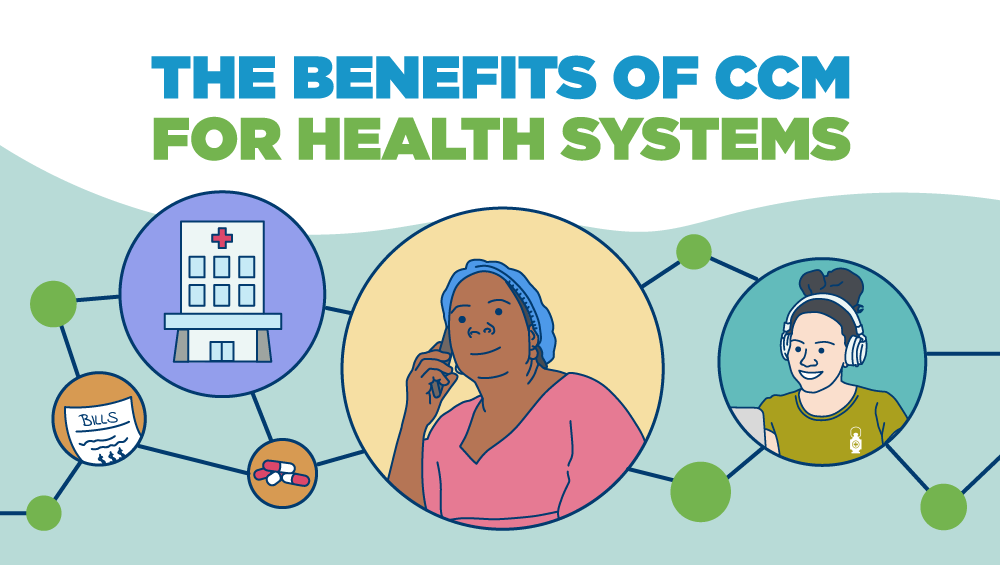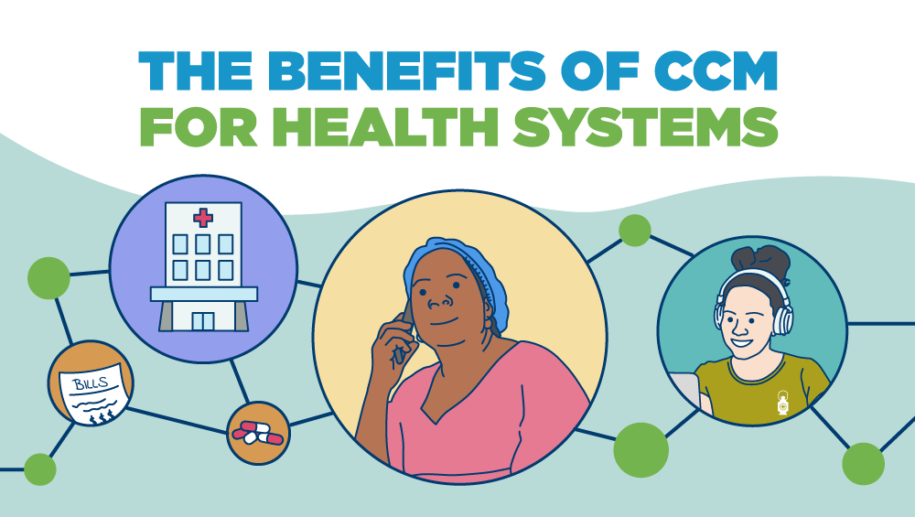
The Benefits of CCM for Health Systems
With all the current advancements in healthcare, Chronic Care Management (CCM) has become imperative, especially for hospitals and clinics struggling with more and more people having long-term health problems. Chronic Care Management is completely revamping how patients get care, not just in one place, but everywhere. In this article, we explore the many benefits that CCM offers to health systems, underscoring its significance in enhancing patient outcomes, optimizing resource allocation, and bolstering the overall efficiency of healthcare services. As we peel back the layers of CCM, it becomes evident how integral it is in steering health systems towards a more sustainable, patient-centered future.
Understanding Chronic Care Management (CCM)
The Concept and Scope of CCM
Chronic Care Management, at its core, is a patient-centric approach aimed at providing comprehensive care coordination for individuals with multiple chronic conditions. This management style is designed to address the complex needs of patients who require extensive and ongoing medical attention. Unlike acute care, which is reactive and episodic, CCM is proactive and longitudinal, focusing on long-term management rather than short-term fixes.
The Rise of Chronic Diseases
The prevalence of chronic diseases has been on an upward trajectory, making their management a critical aspect of modern healthcare. Conditions such as diabetes, heart disease, and respiratory disorders not only impact the quality of life of millions globally but also place a significant strain on health systems. The burden of chronic diseases has necessitated a shift from traditional episodic care to a more sustained and coordinated approach, highlighting the importance of CCM.
CCM in Modern Healthcare Structures
Incorporating CCM into healthcare systems involves a multifaceted strategy. It includes individualized care plans, regular patient monitoring, and the integration of various healthcare services. The goal is to create a seamless care continuum that bridges the gap between different levels of healthcare provision. By doing so, CCM fosters a more integrated, holistic approach to patient care, ensuring that the complex needs of chronic disease patients are met efficiently and effectively.
Economic Benefits of CCM for Health Systems
Reducing Unnecessary Hospitalizations and ER Visits
One of the most significant economic benefits of Chronic Care Management is the reduction in unnecessary hospital admissions and emergency room visits. CCM’s proactive approach ensures that patients receive timely primary care interventions, which often prevents the escalation of their conditions into acute episodes that require expensive emergency care. By managing chronic conditions effectively at earlier stages, health systems can significantly reduce the high costs associated with preventable emergency treatments and hospital stays, thus improving quality and financial performance for those patients attributed to a risk contract or value-based payment model.
According to our research, hospitals that have implemented CCM have seen a 62.5% lower ED utilization (per 1,000) vs the national average (18% vs 48%).
The Fee-for-Service Model
One of the pivotal economic benefits of CCM for health systems operating under the Fee-for-Service (FFS) model is the potential to unlock new revenue streams. CCM services, which are essential for managing patients with multiple chronic conditions, can be billed separately under many healthcare plans, including Medicare. This billing capability provides health systems with an additional revenue stream that was not previously accessible.
The inclusion of CCM services as billable items under healthcare plans is particularly advantageous. It acknowledges the ongoing, proactive management of chronic conditions outside the traditional in-person visit model. For practices, this means that the time spent on coordinating care, managing medication adjustments, and providing telehealth consultations can directly contribute to the practice’s revenue. This is especially relevant in today’s healthcare environment, where the management of chronic diseases constitutes a significant portion of healthcare spending.
Cost-Effectiveness through Improved Patient Management
CCM is inherently cost-effective. By focusing on regular monitoring and management, it minimizes the need for more intensive and costly medical interventions later on. This approach not only results in better patient engagement and health outcomes but also translates into substantial savings for health systems participating in value-based payment models. The efficiency gained from preventing complications and the subsequent need for advanced medical procedures is a key economic advantage of CCM.
Long-Term Financial Sustainability and Efficient Resource Allocation
Existing reimbursements make implementing a CCM program sustainable long term. With resources more efficiently allocated, a successful CCM program allows health systems to focus on slowing the progression of chronic diseases rather than spending excessively on preventable late-stage care. Shifting spend from inpatient to primary care not only better prepares health systems to take on more financial risk in the future, but also allows for better allocation of resources, such as manpower and facilities, which can then be channeled to other essential healthcare services.
Enhancing Patient Outcomes with CCM
Improved Adherence to Medication and Treatment Plans
One of the hallmarks of Chronic Care Management is its ability to enhance patient adherence to a medicinal schedule along with treatment plans. Through regular follow-ups, personalized care plans, and continuous education, patients are more likely to stay on track with their medications and lifestyle changes. This adherence is critical in managing chronic conditions effectively, leading to better overall health outcomes. According to an article published by the National Library of Medicine, the impact of medication nonadherence has a substantial correlation to healthcare costs in several diseases, health outcomes, and healthcare costs.
Regular Monitoring and Early Intervention
CCM enables regular monitoring of patients, allowing healthcare providers to detect and address potential issues before they become severe. This early intervention approach is key in preventing the exacerbation of chronic conditions, which in turn enhances patient outcomes. Regular monitoring also provides a wealth of longitudinal data, enabling healthcare providers to make more informed decisions about patient care.
Demonstrating Improved Health Outcomes
The efficacy of CCM in enhancing patient outcomes is supported by various studies and statistics. Patients enrolled in CCM programs often show significant improvements in managing their conditions, evidenced by reduced flare-ups, better control of symptoms, and improved overall health markers. These improvements not only signify better quality of life for patients but also validate the effectiveness of CCM in chronic disease management.
Streamlining Healthcare Operations
Integration of CCM with Existing Health Systems
When implemented properly, Chronic Care Management (CCM) can seamlessly integrate into primary care workflows, streamlining operations and enhancing overall efficiency. By adopting CCM, health systems can better coordinate between various departments and services, ensuring a more cohesive approach to patient care. This integration reduces duplication of efforts and facilitates a smoother workflow, thus optimizing the use of resources and time.
Role of Remote Patient Monitoring in Chronic Care
For health systems seeking to optimize chronic care management, remote patient monitoring (RPM) emerges as a transformative tool. By continuously gathering vital health data in patients’ homes, RPM empowers proactive interventions, improved health outcomes, and cost savings. Early detection of concerning trends allows for timely adjustments to treatment plans, potentially preventing costly complications and hospitalizations. Additionally, an effective RPM program enhances communication between patients and care teams, fostering patient engagement and self-management skills. This translates to reduced healthcare burden, improved patient satisfaction, and a win-win situation for both health systems and individuals living with chronic conditions. By embracing RPM, health systems can unlock a future of proactive, data-driven chronic care, delivering better patient experiences and sustainable healthcare models.
Addressing Challenges and Implementing CCM Effectively
Common Challenges in Adopting CCM
Despite its benefits, the implementation of CCM can encounter several challenges. These include resistance to change in established practices, the need for hiring, training and upskilling of healthcare staff, and initial costs of setting up the required infrastructure. Additionally, ensuring patient engagement and compliance with CCM protocols can be challenging, especially in diverse patient populations with varying needs and preferences.
Strategies for Effective Implementation
To overcome these challenges, health systems need to adopt strategic planning and provide comprehensive training to their staff. Engaging with patients and educating them about the benefits of CCM is crucial for successful enrollment and continuous engagement. Furthermore, leveraging technology and data analytics can help in personalizing care plans and improving the efficiency of CCM practices.
Remotely Embedded CCM as an Option
Opting for a remote CCM provider presents a strategic solution to these hurdles, effectively streamlining the process. By leveraging the expertise and established infrastructure of a remote CCM provider, health systems can bypass the complexities and resource demands of developing a CCM program in-house. This approach not only mitigates the resistance to change by introducing specialized, external teams adept at navigating such transitions but also significantly reduces the initial setup costs and the need for extensive staff training.
Furthermore, remote CCM providers bring to the table sophisticated patient enrollment and engagement strategies designed to cater to the diverse needs and preferences of patient populations, ensuring higher compliance rates and more effective management of chronic conditions. This turnkey solution allows health systems to focus on their core mission of delivering quality care, while the specialized CCM provider handles the intricacies of chronic care management as a white labeled extension.
The Power of CCM for Health Systems – A Summary
Chronic Care Management is more than just a healthcare approach; it’s a paradigm shift in managing chronic conditions. It offers significant economic benefits, enhances patient outcomes, and streamlines healthcare operations, making it an invaluable asset to health systems. As healthcare continues to evolve, CCM stands out as a beacon of efficient, patient-centered care, guiding health systems towards more sustainable and effective management of chronic diseases. Embracing and effectively implementing CCM is not just beneficial; it is essential for the future of healthcare.
Experience the Benefits of CCM for your Health System with Signallamp Health
Remotely-embedded chronic care management (CCM) offers transformative support for patients juggling complex health conditions. Personalized care plans, improved care coordination, and ongoing communication with a dedicated team empower patients to manage their health proactively. This holistic approach demonstrably improves patient outcomes, reduces healthcare costs, and fosters deeper patient engagement and satisfaction.
Harnessing the true power of CCM demands a solution that seamlessly integrates with your existing processes and empowers both your team and your patients. To explore how a robust CCM system can elevate your health system, schedule a consultation with Signallamp and discover how you can unlock the full potential of this transformative approach. Learn more.

